Pro go player Hsu Ching-en won two games in a row to defeat Lin Yan-cheng in the Speed Go Championship final in Taipei on Monday and become the youngest winner of the title.
The 16-year-old phenomenon took a mere 69 minutes to bring down fourth dan Lin in Game 2 at the HaiFong Go Association and bag the NT$600,000 (US$19,042) top prize.
“I played better than I did in the first match against Lin and I’m super happy to have won the tournament,” said fifth dan Hsu, who was crowned the “King of Newcomers” in June.
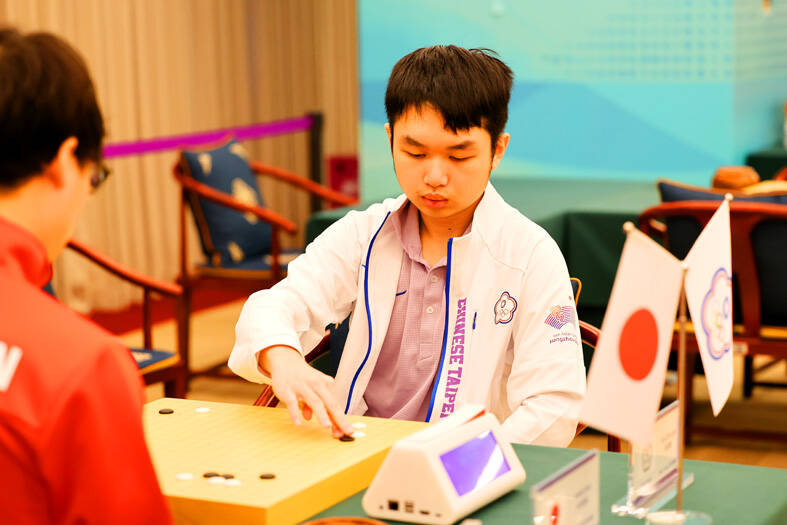
Photo courtesy of the Chinese Taipei Olympic Committee
The tournament is held annually for newcomers under the age of 25 who have not won any of the four major titles in Taiwan — each of which boasts a top prize of more than NT$1 million.
Despite his victory, Hsu said he still felt he was not a good enough speed go player.
Compared with regular matches, Hsu said he believes speed go “relies much more on intuition, because of the shorter time frame,” and he believes his slow go game is better.
In a pro game in Taiwan, a player generally has at least one hour to ponder their moves, but they only have 10 minutes in a speed go game, apart from during the byo-yomi phase, when players have additional time to make moves.
Lin said his debut in the best-of-three final had been “terrible” and he had been too nervous.
He added that he messed up the opening phase of Game 1 on Monday last week, failed to occupy territory on Monday, and misjudged his middlegame.
“I hope I will be less nervous when playing games in the future,” said Lin, who still won NT$200,000 for finishing second.
The conclusion of the Speed Go Championship means that all of this year’s nine major domestic tourneys are complete.
Asian Games gold medalist Hsu Hao-hung won six titles, with ninth dan Wang Yuan-jyun, eighth dan Lai Jyun-fu and Hsu Ching-en each winning one of the other three.
Wang, now 27, swept Hsu Ching-en 2-0 in March to take the HaiFong Tournament title, while Lai won his first Taiwan Meijin tournament in the middle of May.
Hsu Ching-en, who turns 17 on Dec. 26, was the youngest male player to compete for Taiwan in the Hangzhou Asian Games in September and October, and is considered, along with Lai, to be a rising star.
Wang, who was commentating the match on Monday, said that Hsu Ching-en’s rise was expected, as he and Hsu Hao-hung both peaked in Taiwanese go by the time they were 18.
“History keeps repeating itself,” Wang said.
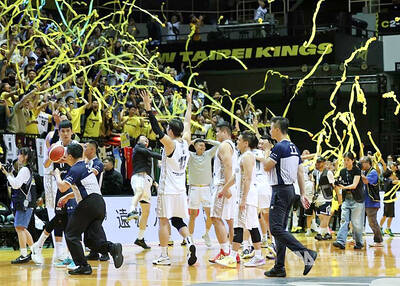
The New Taipei Kings claimed the inaugural Taiwan Professional Basketball League (TPBL) championship on Sunday, defeating the Kaohsiung FamilyMart Aquas 108-89 in the final. Playing at home, the Kings pulled ahead with Jeremy Lin’s (林書豪) clutch three-pointers, securing their victory over the Aquas in the TPBL final. The Kings came out strong in the first quarter, dominating to build a 35-18 lead. By halftime, they had stretched their advantage to 61-38. In the third quarter, the Aquas narrowed the deficit to 12 points, but Lin stepped up, sinking several tough three- pointers to extend the lead. In the final quarter, the Kings pushed the
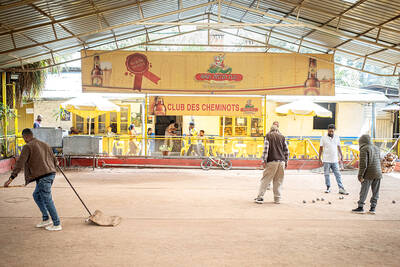
In an unlikely Ethiopian outpost of one the most French of pastimes, four men are leaning over their petanque balls, arguing over who is winning. Petanque, the bowling game also known as boules, is more readily associated with French village squares where locals launch metal balls at a jack while enjoying an afternoon drink, but for decades, it has also been a beloved pastime for members of a club near the iconic Meskel Square in the Ethiopian capital, Addis Ababa. It was founded in the early 20th century to cater to French railway workers, who built a line connecting Addis Ababa
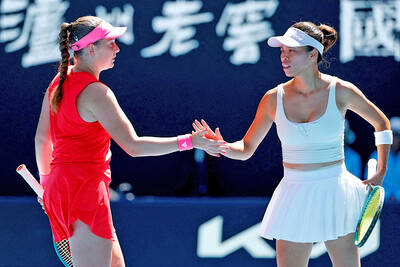
Taiwanese women’s doubles star Hsieh Su-wei and Australian teenager Maya Joint on Tuesday eased into the Eastbourne Open quarter-finals in England as Hsieh prepares for the Wimbledon Championships next week. Four-time Wimbledon women’s doubles champion Hsieh and 19-year-old Joint fired two aces and converted five of eight break points to defeat Japan’s Shuko Aoyama and Poland’s Katarzyna Piter 6-3, 6-3 in 58 minutes on the grass court. Hsieh and Joint are today to face fourth seeds Barbora Krejcikova of the Czech Republic and Latvia’s Jelena Ostapenko, who advanced on Monday with a 6-4, 6-3 victory over Quinn Gleason of the US and
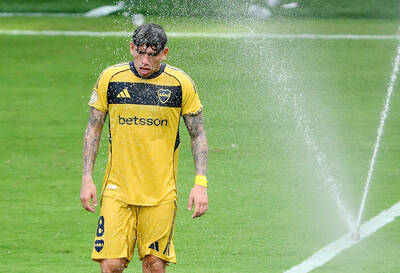
BEAT THE HEAT: A brutal heat wave in the US has made cooling breaks standard. Dortmund’s coach said the weather could shape the destiny of the tournament Chelsea on Tuesday beat Esperance of Tunisia 3-0 to set up a FIFA Club World Cup last-16 tie against SL Benfica, who earlier defeated Bayern Munich 1-0, as furnace-link heat and the threat of thunder and lightning wreak havoc at the tournament. Elsewhere, minnows Auckland City claimed a memorable draw against Boca Juniors, while Los Angeles bowed out of the tournament with a stalemate against Flamengo. In Charlotte, Andreas Schjelderup scored the only goal for Benfica in their Group C clash with Bayern in front of 33,287 fans, finishing first-time from a cutback by his fellow Norwegian Fredrik Aursnes in the 13th